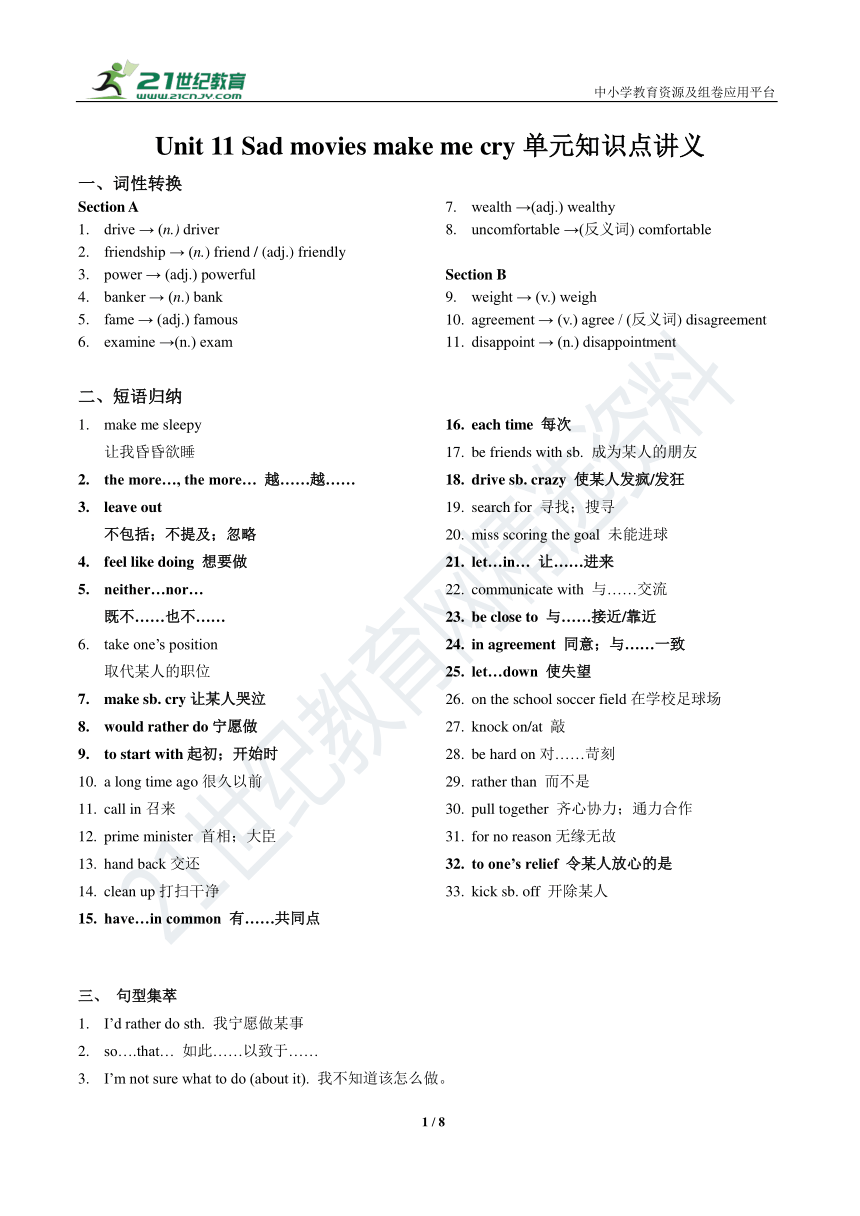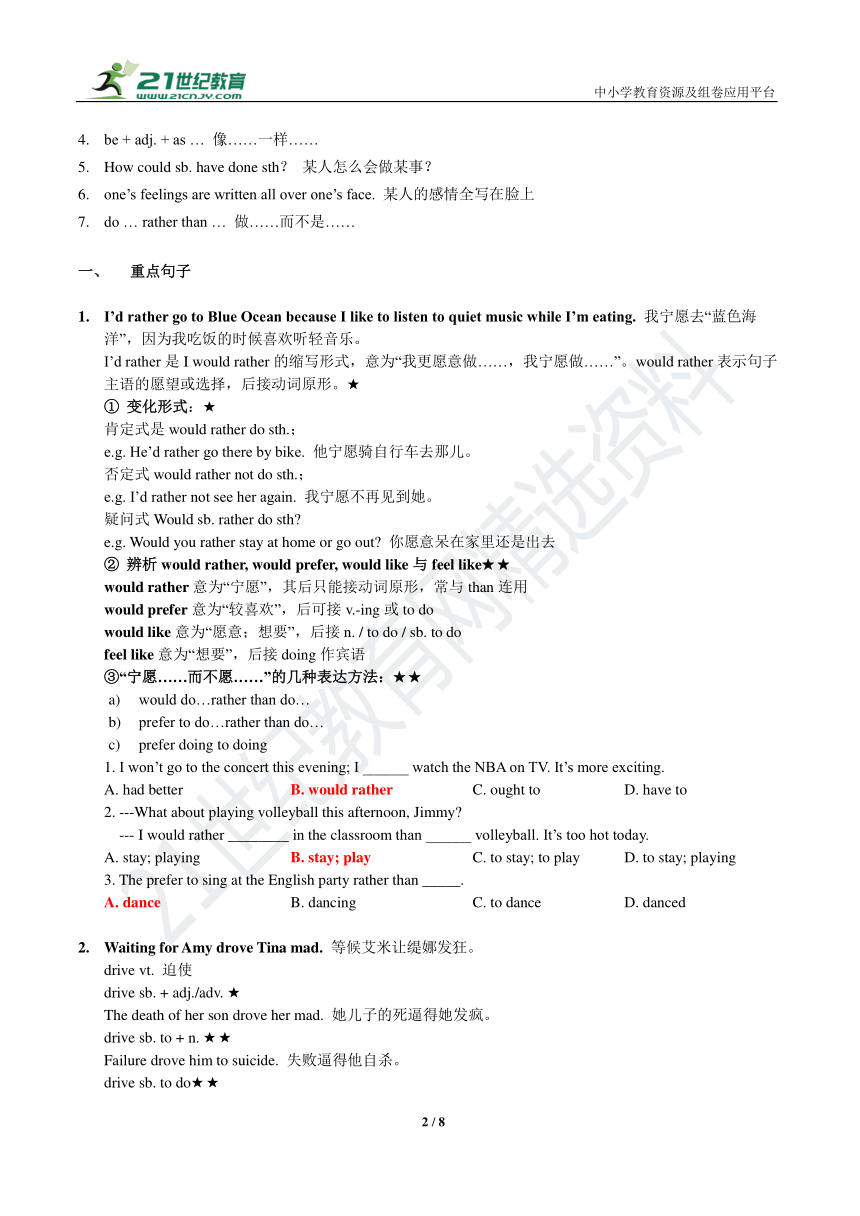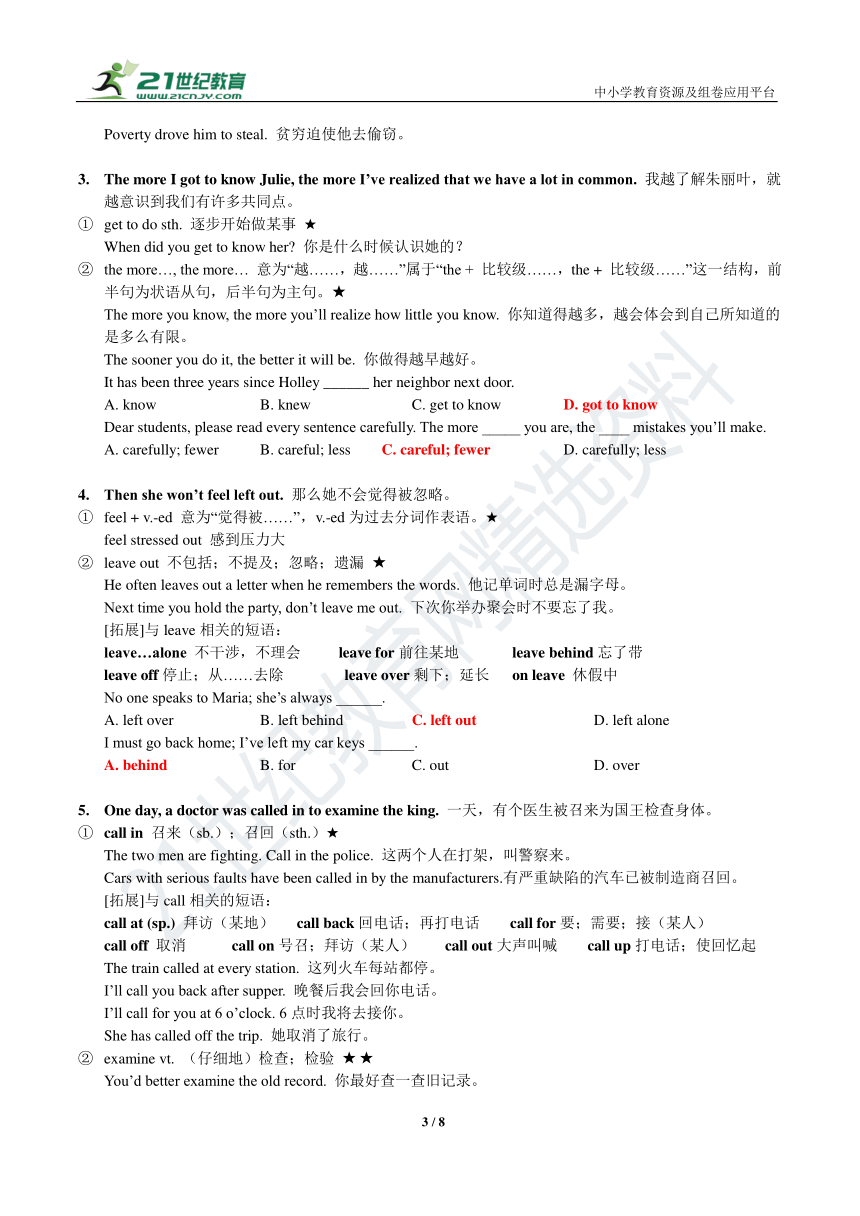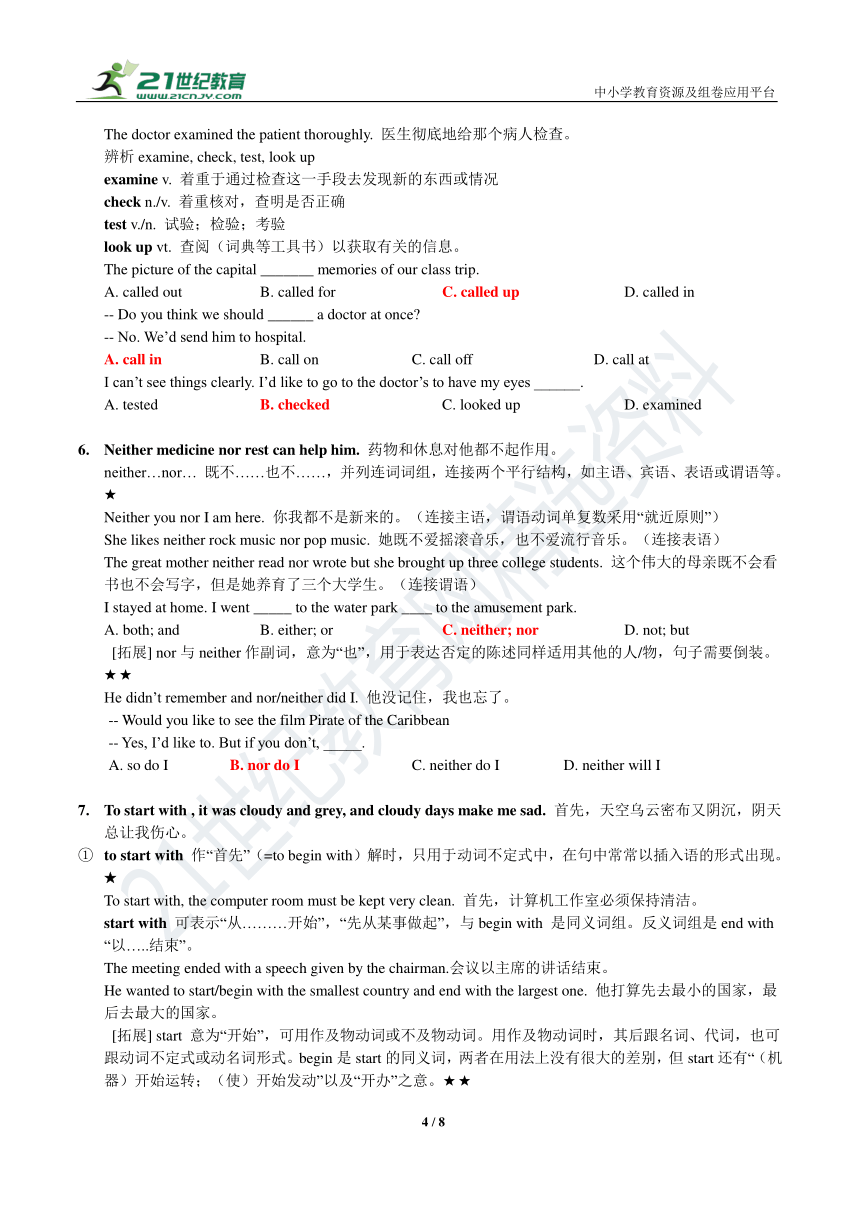Unit 11 Sad movies make me cry.单元知识点讲义
文档属性
| 名称 | Unit 11 Sad movies make me cry.单元知识点讲义 |  | |
| 格式 | zip | ||
| 文件大小 | 1.2MB | ||
| 资源类型 | 试卷 | ||
| 版本资源 | 人教新目标(Go for it)版 | ||
| 科目 | 英语 | ||
| 更新时间 | 2020-02-05 19:57:22 | ||
图片预览




文档简介
中小学教育资源及组卷应用平台
Unit 11 Sad movies make me cry单元知识点讲义
一、词性转换
Section A
drive → (n.) driver
friendship → (n.) friend / (adj.) friendly
power → (adj.) powerful
banker → (n.) bank
fame → (adj.) famous
examine →(n.) exam
wealth →(adj.) wealthy
uncomfortable →(反义词) comfortable
Section B
weight → (v.) weigh
agreement → (v.) agree / (反义词) disagreement
disappoint → (n.) disappointment
二、短语归纳
make me sleepy
让我昏昏欲睡
the more…, the more… 越……越……
leave out
不包括;不提及;忽略
feel like doing 想要做
neither…nor…
既不……也不……
take one’s position
取代某人的职位
make sb. cry让某人哭泣
would rather do宁愿做
to start with起初;开始时
a long time ago很久以前
call in召来
prime minister 首相;大臣
hand back交还
clean up打扫干净
have…in common 有……共同点
each time 每次
be friends with sb. 成为某人的朋友
drive sb. crazy 使某人发疯/发狂
search for 寻找;搜寻
miss scoring the goal 未能进球
let…in… 让……进来
communicate with 与……交流
be close to 与……接近/靠近
in agreement 同意;与……一致
let…down 使失望
on the school soccer field在学校足球场
knock on/at 敲
be hard on对……苛刻
rather than 而不是
pull together 齐心协力;通力合作
for no reason无缘无故
to one’s relief 令某人放心的是
kick sb. off 开除某人
三、 句型集萃
I’d rather do sth. 我宁愿做某事
so….that… 如此……以致于……
I’m not sure what to do (about it). 我不知道该怎么做。
be + adj. + as … 像……一样……
How could sb. have done sth? 某人怎么会做某事?
one’s feelings are written all over one’s face. 某人的感情全写在脸上
do … rather than … 做……而不是……
重点句子
I’d rather go to Blue Ocean because I like to listen to quiet music while I’m eating. 我宁愿去“蓝色海洋”,因为我吃饭的时候喜欢听轻音乐。
I’d rather是I would rather的缩写形式,意为“我更愿意做……,我宁愿做……”。would rather表示句子主语的愿望或选择,后接动词原形。★
① 变化形式:★
肯定式是would rather do sth.;
e.g. He’d rather go there by bike. 他宁愿骑自行车去那儿。
否定式would rather not do sth.;
e.g. I’d rather not see her again. 我宁愿不再见到她。
疑问式Would sb. rather do sth?
e.g. Would you rather stay at home or go out? 你愿意呆在家里还是出去
② 辨析would rather, would prefer, would like与feel like★★
would rather意为“宁愿”,其后只能接动词原形,常与than连用
would prefer意为“较喜欢”,后可接v.-ing或to do
would like意为“愿意;想要”,后接n. / to do / sb. to do
feel like意为“想要”,后接doing作宾语
③“宁愿……而不愿……”的几种表达方法:★★
would do…rather than do…
prefer to do…rather than do…
prefer doing to doing
1. I won’t go to the concert this evening; I ______ watch the NBA on TV. It’s more exciting.
A. had better B. would rather C. ought to D. have to
2. ---What about playing volleyball this afternoon, Jimmy?
--- I would rather ________ in the classroom than ______ volleyball. It’s too hot today.
A. stay; playing B. stay; play C. to stay; to play D. to stay; playing
3. The prefer to sing at the English party rather than _____.
A. dance B. dancing C. to dance D. danced
Waiting for Amy drove Tina mad. 等候艾米让缇娜发狂。
drive vt. 迫使
drive sb. + adj./adv. ★
The death of her son drove her mad. 她儿子的死逼得她发疯。
drive sb. to + n. ★★
Failure drove him to suicide. 失败逼得他自杀。
drive sb. to do★★
Poverty drove him to steal. 贫穷迫使他去偷窃。
The more I got to know Julie, the more I’ve realized that we have a lot in common. 我越了解朱丽叶,就越意识到我们有许多共同点。
get to do sth. 逐步开始做某事 ★
When did you get to know her? 你是什么时候认识她的?
the more…, the more… 意为“越……,越……”属于“the + 比较级……,the + 比较级……”这一结构,前半句为状语从句,后半句为主句。★
The more you know, the more you’ll realize how little you know. 你知道得越多,越会体会到自己所知道的是多么有限。
The sooner you do it, the better it will be. 你做得越早越好。
It has been three years since Holley ______ her neighbor next door.
A. know B. knew C. get to know D. got to know
Dear students, please read every sentence carefully. The more _____ you are, the ____ mistakes you’ll make.
A. carefully; fewer B. careful; less C. careful; fewer D. carefully; less
Then she won’t feel left out. 那么她不会觉得被忽略。
feel + v.-ed 意为“觉得被……”,v.-ed为过去分词作表语。★
feel stressed out 感到压力大
leave out 不包括;不提及;忽略;遗漏 ★
He often leaves out a letter when he remembers the words. 他记单词时总是漏字母。
Next time you hold the party, don’t leave me out. 下次你举办聚会时不要忘了我。
[拓展]与leave相关的短语:
leave…alone 不干涉,不理会 leave for前往某地 leave behind忘了带
leave off停止;从……去除 leave over剩下;延长 on leave 休假中
No one speaks to Maria; she’s always ______.
A. left over B. left behind C. left out D. left alone
I must go back home; I’ve left my car keys ______.
A. behind B. for C. out D. over
One day, a doctor was called in to examine the king. 一天,有个医生被召来为国王检查身体。
call in 召来(sb.);召回(sth.)★
The two men are fighting. Call in the police. 这两个人在打架,叫警察来。
Cars with serious faults have been called in by the manufacturers.有严重缺陷的汽车已被制造商召回。
[拓展]与call相关的短语:
call at (sp.) 拜访(某地) call back回电话;再打电话 call for要;需要;接(某人)
call off 取消 call on号召;拜访(某人) call out大声叫喊 call up打电话;使回忆起
The train called at every station. 这列火车每站都停。
I’ll call you back after supper. 晚餐后我会回你电话。
I’ll call for you at 6 o’clock. 6点时我将去接你。
She has called off the trip. 她取消了旅行。
examine vt. (仔细地)检查;检验 ★★
You’d better examine the old record. 你最好查一查旧记录。
The doctor examined the patient thoroughly. 医生彻底地给那个病人检查。
辨析examine, check, test, look up
examine v. 着重于通过检查这一手段去发现新的东西或情况
check n./v. 着重核对,查明是否正确
test v./n. 试验;检验;考验
look up vt. 查阅(词典等工具书)以获取有关的信息。
The picture of the capital _______ memories of our class trip.
A. called out B. called for C. called up D. called in
-- Do you think we should ______ a doctor at once?
-- No. We’d send him to hospital.
A. call in B. call on C. call off D. call at
I can’t see things clearly. I’d like to go to the doctor’s to have my eyes ______.
A. tested B. checked C. looked up D. examined
Neither medicine nor rest can help him. 药物和休息对他都不起作用。
neither…nor… 既不……也不……,并列连词词组,连接两个平行结构,如主语、宾语、表语或谓语等。★
Neither you nor I am here. 你我都不是新来的。(连接主语,谓语动词单复数采用“就近原则”)
She likes neither rock music nor pop music. 她既不爱摇滚音乐,也不爱流行音乐。(连接表语)
The great mother neither read nor wrote but she brought up three college students. 这个伟大的母亲既不会看书也不会写字,但是她养育了三个大学生。(连接谓语)
I stayed at home. I went _____ to the water park ____ to the amusement park.
A. both; and B. either; or C. neither; nor D. not; but
[拓展] nor与neither作副词,意为“也”,用于表达否定的陈述同样适用其他的人/物,句子需要倒装。★★
He didn’t remember and nor/neither did I. 他没记住,我也忘了。
-- Would you like to see the film Pirate of the Caribbean
-- Yes, I’d like to. But if you don’t, _____.
A. so do I B. nor do I C. neither do I D. neither will I
To start with , it was cloudy and grey, and cloudy days make me sad. 首先,天空乌云密布又阴沉,阴天总让我伤心。
to start with 作“首先”(=to begin with)解时,只用于动词不定式中,在句中常常以插入语的形式出现。★
To start with, the computer room must be kept very clean. 首先,计算机工作室必须保持清洁。
start with 可表示“从………开始”,“先从某事做起”,与begin with 是同义词组。反义词组是end with “以…..结束”。
The meeting ended with a speech given by the chairman.会议以主席的讲话结束。
He wanted to start/begin with the smallest country and end with the largest one. 他打算先去最小的国家,最后去最大的国家。
[拓展] start 意为“开始”,可用作及物动词或不及物动词。用作及物动词时,其后跟名词、代词,也可跟动词不定式或动名词形式。begin是start的同义词,两者在用法上没有很大的差别,但start还有“(机器)开始运转;(使)开始发动”以及“开办”之意。★★
As soon as we got there, it started/began raining. 我们一到那儿就开始下雨了。
I could not start my car. 我无法发动车子。
make me sad “让我伤心”, sad 作make的宾语补足语。★
他想在英语课上以说汉语开始。He wanted to ______ _______ ______ Chinese in English class. (答案:start/begin with speaking)
The general cannot find a happy person and the king remains unhappy forever. 将军没有找到快乐的人,国王永远都会不开心。
remain link-v. “保持;依然”,后接n. , adj. v.-ing , v.-ed或prep. phrases等作表语,相当于keep或stay。★
They remained good friends even though they entered different high schools.他们虽进入不同的高中就读,但是仍然是好朋友。
The weather still remained cold in April.四月天气仍然冷。
I can’t go to the cinema because I have a lot of homework remaining undone.我不能去看电影,因为我有许多作业仍然未做。
[拓展] remain vi. ★★
remain vi.”剩余;剩下”,作定语用v.-ing形式,而leave作定语用过去分词(left).
When the man arrived home, no food remained on the table.当这个男士到家时,餐桌上什么吃的也没有剩下。
remain vi. 留下;逗留
How long will you remain here? 你要在此地停留多久?
remain vi. 尚待……;留待…….
A lot of problems remain to be solved.有许多问题尚待解决。
辨析leave ,stay与remain
leave vt. 常与表示地点的介词短语连用
He often left his homework at home.他总把作业落在家里。
stay vi. 暂时停留
She will stay in Shanghai for three days.她将在上海待3天。
remain vi. 表示在经历一些变迁后仍然留在原来的地方
He remained here after the accident.事故发生后,他仍然留在这里。
The true author of the new book about teenagers _______ unknown.
A. left B. remained C. stay D. still
用leave, stay与remain的适当形式填空:
We all went to the theatre except Jim. he _____ at home. (答案:stayed)
I asked her a few questions, but she _______ silent. (答案:remained)
Mark sometimes _______ his umbrella in the subway. (答案:left)
To his surprise and relief, his teammates all nodded in agreement. 令他吃惊和放心的是,他的队友们都点头赞同。
relief n. 轻松,解脱 relieve vt. 使(人)放松;减轻 ★
The mother gave a sigh of relief when her son showed up. 当她的儿子出现时,这个妈妈宽慰地松了口气。
relief n. 减轻;减低
Will this medicine give immediate relief from pain? 这种药能马上缓解疼痛吗?
relief n. 救助;救援
Send relief to refugees. 送救济物品给难民。
to one’s relief 令某人放心/安心的是
To the boy’s relief, his parents didn’t blame him.令这个男孩放心的是,他的父母并没有责备他。
[拓展] to one’s + n. (= to the + n. + of sb.) “使/令人……”,此结构中的n.为含有感彩的词,前用much修饰,意为“很,非常”。
to one’s surprise / satisfaction / disappointment / joy / sadness / excitement / embarrassment 令某人吃惊/满意/失望/高兴/悲伤/兴奋/难为情的是
agreement n. (意见或看法)一致;同意。反义词是disagreement ★
He nodded to show his agreement. 他点头表示同意。
in agreement (with) 同意;与……一致
We’re all in agreement on that point.
达成协议:arrive at / come to / reach an agreement
签订协议:make / conclude an agreement
违反协定:break an agreement
It was a great ______ to find that they were safe.
A. disappointment B. relief C. uncomfort D. pity
There’s no _____ yet about what to do next.
A. disagreement B. agreement C. decision D. goal
She was worried because she disappointed her parents. 她担心,因为她让父母失望了。
disappoint vt. “使失望”,后常接人作宾语,多用于被动语态。★
What he had done disappointed his teacher. 他所做的事让老师失望。
be disappointed at sth. 对某事感到失望
I’m very disappointed at the result of the game. 我对比赛结果很失望。
be disappointed in / with sb. 对某人感到失望
I was very disappointed with myself.
be disappointed to do sth. 对某事的发生感到失望
He was disappointed to see she wasn’t at the party. 看到她没来参加晚会他感到很失望。
be disappointed + that从句 对某事的发生感到失望
I’m disappointed that it was sold out. 全都卖完了,我感到很失望。
辨析disappointed, disappointed ★★
disappointing意为“令人失望的”,主语常是物,含有主动的意味。
disappointed意为“感到失望的”,主语常是人,作定语时所修饰的若是人则表示有被动的含义。
She felt _______ when she heard the _______ news.
A. disappointing; disappointed B. disappointed; disappointed
C. disappointing; disappointing D. disappointed; disappointing
五、语法归纳:宾语补足语
概念:宾语后面加上一个词或短语补充说明宾语,使句子结构更加完整,加上的这个成分我们称之为宾语补足语(简称宾补)。它可以是名词、形容词、副词、分词或动词不定式等。
构成:
make +宾语+宾语补足语的用法:
形容词作宾补:make+宾语+形容词。
这一结构表示的意思是“使某人/某事(变得)…..”,宾语补足语用来修饰人或事物的性质或所处的状态。
The news made me happy. 这个消息使我高兴。
They work hard to make our country rich and strong.他们为使我们的国家富强而努力工作。
注意:当宾语为不定式或从句时,多用it作形式宾语。
The heavy rain made it impossible for us to go out. 大雨使我们无法出去。
make+宾语+不带to的不定式。
这一结构表示的意思是“使某人做某事”。
The teacher made her copy the whole text.老师让她抄写整篇课文。
注意:转为被动语态时,原不带to的不定式要变成带to的不定式。
She was made to copy the whole text by the teacher.她被老师要求抄写整篇课文。
make+宾语+名词。
这一结构表示的意思是“使/让某人或某物(成为)…….”。
We made him our monitor. 我们选他当我们的班长。
make+宾语+过去分词。
这一结构表示的意思是“使某人/某事被做…..”。宾语补足语是过去分词时,宾语是过去分词的逻辑宾语,宾语和过去分词之间存在逻辑上的被动关系。
We should not make our plan known to everybody.我们不应该使每个人都知道我们的计划。
make+宾语+现在分词。
这一结构表示的意思是“某人/某事一直在……”,现在分词与宾语之间存在着逻辑上的主谓关系。
He makes the boy standing all the time.他让那个男孩一直站着 。
make+宾语+介词短语。
We made butter from milk.我们用牛奶制成奶油。
【通化中考】The woman made his son ______ finally after she told him some jokes.
A. laughed B. to laugh C. laugh D. laughing
Danny did all kinds of things to make the baby _______.
A. to stop crying B. stop crying C. to stop to cry D. stop to cry
-- Why do you speak in ________ a loud voice?
-- Because I want to make myself ______ clearly.
A. such; hear B. so; heard C. such; heard D. so; hear
【襄阳中考】 --What kind of music do you prefer?
--I prefer the music that __________________ (使我放松的)。(make) (答案:makes me relaxed/relax)
The awful color _____________________(让我感到不舒服)。(make) (答案:made me uncomfortable)
63 / 63
同课章节目录
- Unit 1 How can we become good learners.
- Section A
- Section B
- Unit 2 I think that mooncakes are delicious!
- Section A
- Section B
- Unit 3 Could you please tell me where the restroom
- Section A
- Section B
- Unit 4 I used to be afraid of the dark.
- Section A
- Section B
- Unit 5 What are the shirts made of?
- Section A
- Section B
- Review of Units 1-5
- Unit 6 When was it invented?
- Section A
- Section B
- Unit 7 Teenagers should be allowed to choose their
- Section A
- Section B
- Unit 8 It must belong to Carla.
- Section A
- Section B
- Unit 9 I like music that I can dance to.
- Section A
- Section B
- Unit 10 You're supposed to shake hands.
- Section A
- Section B
- Review of Units 6-10
- Unit 11 Sad movies make me cry.
- Section A
- Section B
- Unit 12 Life is full of the unexpected
- Section A
- Section B
- Unit 13 We're trying to save the earth!
- Section A
- Section B
- Unit 14 I remember meeting all of you in Grade 7.
- Section A
- Section B
- Review of Units 11-14
